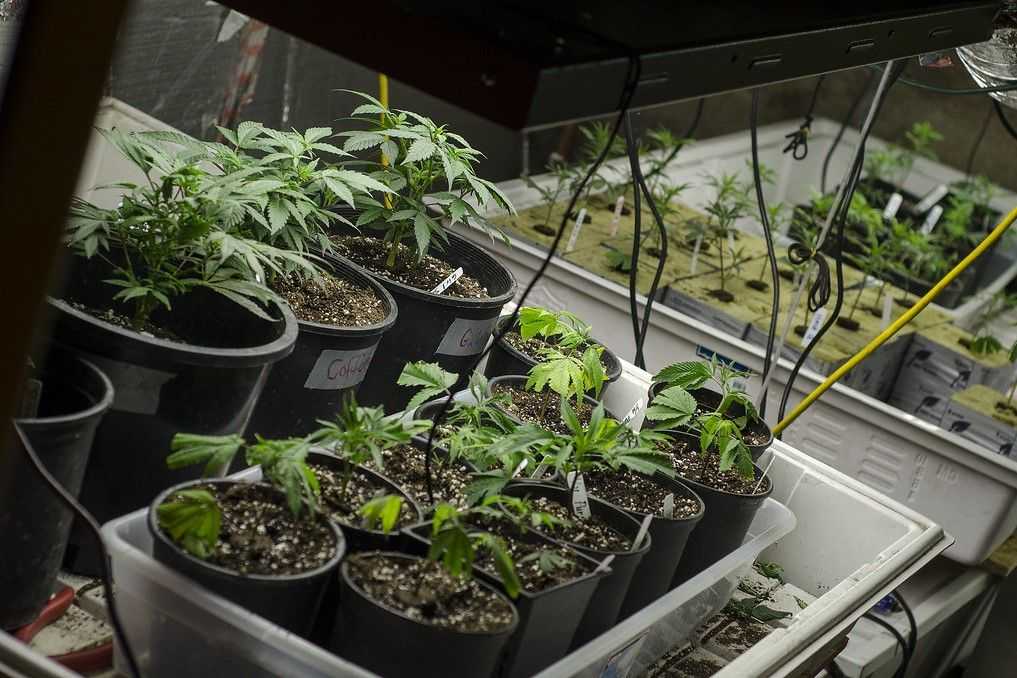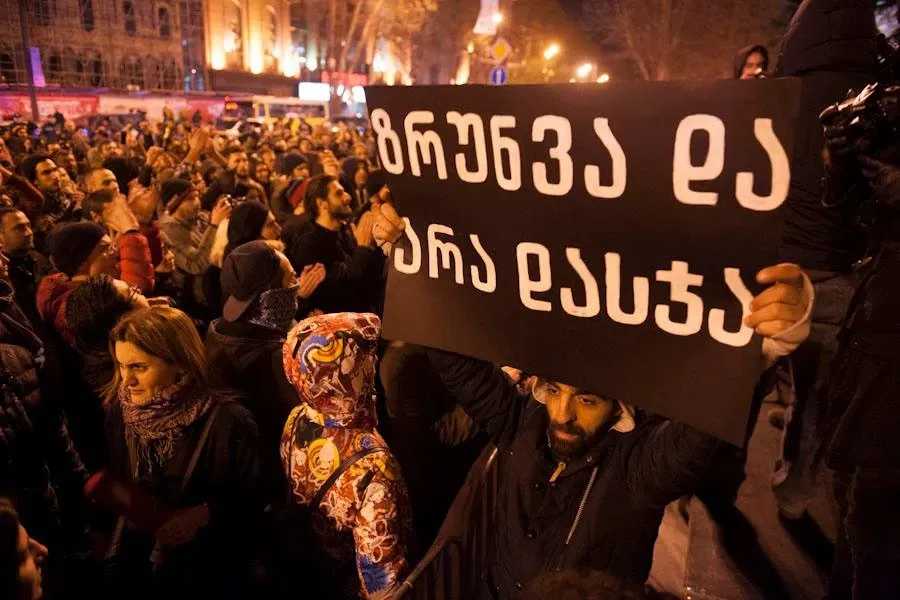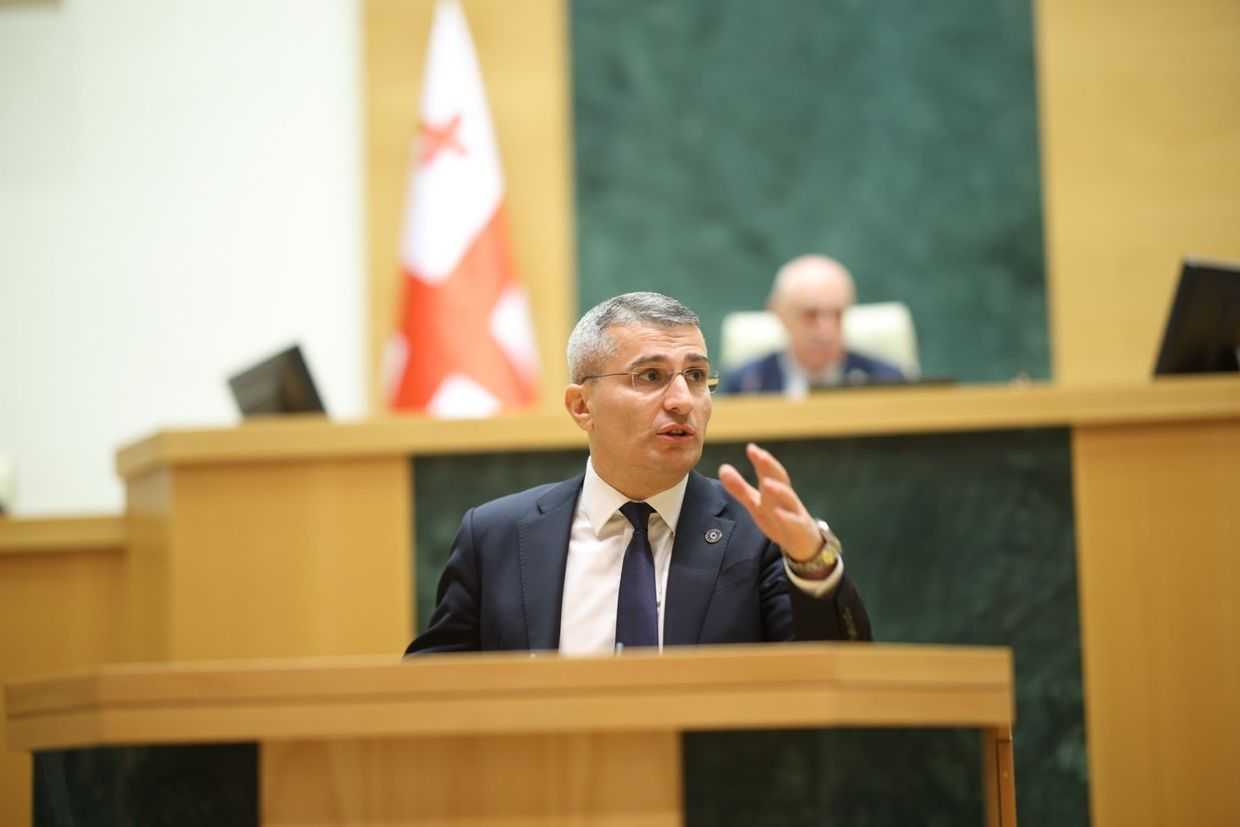
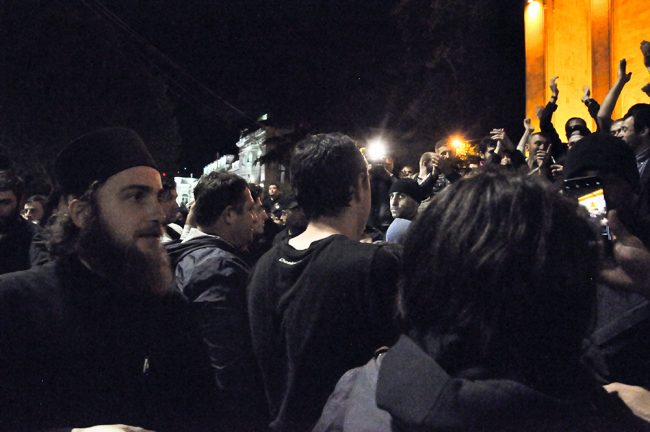
 Georgia’s Orthodox Church distanced themselves from neo-Nazi groups, at a press conference at the Patriarchate on Monday, according to Netgazeti. Announcing their plans for 17 May — International Day Against Homophobia, Transphobia, and Biphobia — the Church urged any ‘aggressive’ groups to abstain from participating in events, and disavowed neo-Nazi group the Nationalist Socialist Movement — National Unity of Georgia.
Georgia’s Orthodox Church distanced themselves from neo-Nazi groups, at a press conference at the Patriarchate on Monday, according to Netgazeti. Announcing their plans for 17 May — International Day Against Homophobia, Transphobia, and Biphobia — the Church urged any ‘aggressive’ groups to abstain from participating in events, and disavowed neo-Nazi group the Nationalist Socialist Movement — National Unity of Georgia.
The Church have marked 17 May as Family Purity Day since 2014, a year after tens of thousands of demonstrators led by priests attacked a handful of queer rights protesters in the capital.
Over the weekend, thousands protested in response to police raids on two popular nightclubs — Bassiani and Café Gallery. On Sunday, a far-right counter-protest was held, with demonstrators several times trying unsuccessfully to break through police lines and reach the original rally, throwing bottles and stones at police. Several priests attended both Sunday and Monday’s counter-protests.
The National Unity of Georgia, one of the organisers of the counter-rally, gave Nazi salutes and chanted ‘death to the enemy’ as they marched through central Tbilisi. On Tuesday the group announced they would march for Family Purity Day on 17 May along the central Rustaveli Avenue.
Far-right counter-rally gathered near 9 April Square after being prevented by police from going to the parliament where #Bassiani #CafeGallery protest is being held #Tbilisi pic.twitter.com/AQylLaTIts
— OC Media (@OCMediaorg) May 13, 2018
Far-right groups chanting ‘death to the enemy’. (Mari Nikuradze /OC Media)
As the two rallies were underway, the Georgian Orthodox Church appeared to blame the situation on the main rally, defending far-right counter-protesters.
‘The statements and behaviour of some of the youth gathered in front of the [parliament building] gave grounds for a counter-demonstration’, their statement said. The Patriarchate also urged both protests to disperse and stated that they were ready to ‘join in the dialogue and discuss all issues’.
A number of conservative and far-right groups continued to protest on Tbilisi’s central Rustaveli Avenue on Monday, against what they termed ‘drug dealers and LGBT propagandists’.
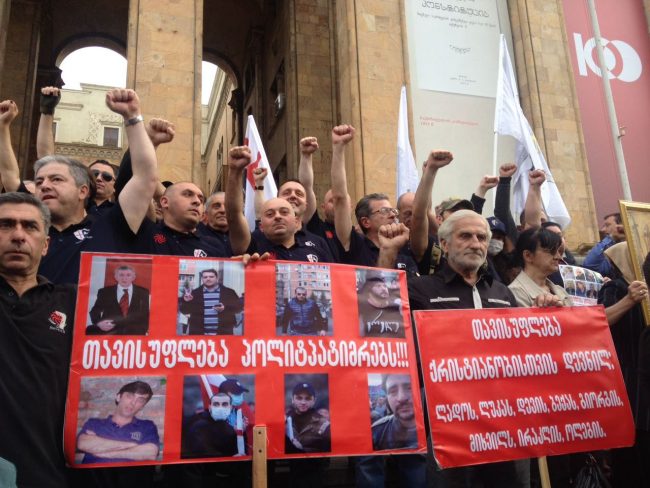
The conservative groups had pledged to occupy the space in front of parliament until at least 17 May but did not turn out on Tuesday.
[Read on OC Media for more on the weekend’s raids and protests: Interior minister apologises over Tbilisi nightclub raids as far-right groups plan daily protests]
Monday’s rally was organised by conservative political party Georgian Idea, who have no seats in parliament, and was joined by the far-right March of Georgians group. The rally of around 200 people concluded peacefully and without arrests, but according to the Public Broadcaster, the Ministry of Internal Affairs has launched an investigation against one participant for obstruction of a journalist’s work.
Speaking to the rally, one of the leaders of the March of Georgians, former MP Dimitri Lortkipanidze, demanded that Café Gallery vacate its building, as it was previously a church. He also demanded Bassiani be renamed, claiming it is a ‘historic term’ marking a victorious battle led by medieval Georgian monarch Queen Tamar.
[See recent controversy over the use of Queen Tamar’s image on OC Media: Georgian condom brand fined ₾500 for ‘unethical’ designs]
MP Emzar Kvitsiani from the conservative Alliance of Patriots party spoke to journalists at the rally, calling for all ‘national’ groups to unite.
Kvitsiani, one of the party’s six MPs, recently lodged a draft amendment to remove ‘sexual orientation’ and ‘gender identity’ from the Law on Elimination of All Forms of Discrimination. The amendment was prepared by Zviad Tomaradze from the Demographic Society of Georgia, a group known for making homophobic and anti-abortion statements.
Tbilisi City Court ordered all eight suspects arrested prior to Friday night’s raids to be held in pretrial detention on Monday. Seven are facing 7–14 years and another 8–20 years or life in prison on drugs charges.
Government under fire
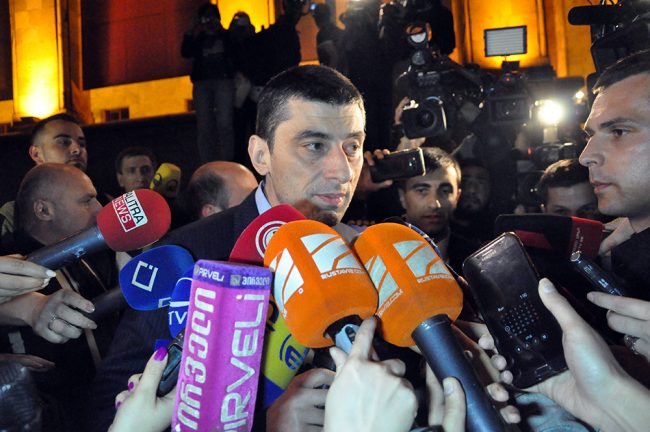
The government has faced criticism from opposition parties for both the initial raid and the far-right counter-protests. On Wednesday, European Georgia MP Giorgi Tughushi called for Interior Minister Giorgi Gakharia to submit himself to parliament to answer questions about the ‘fascist slogans’ used at the counter-rallies.
Mamuka Mdinaradze, head of the Georgian Dream faction in parliament, confirmed on Tuesday that Gakharia would answer MPs’ questions by the end of the week.
On Tuesday, answering opposition lawmakers in parliament, Foreign Minister Mikheil Janelidze insisted the government ‘will always fight these groups’ and ‘will take all necessary steps to prevent radicalisation, a conflict between radical groups, and of course, to counter Russia’s interests in Georgia’. Far-right groups in Georgia have often been accused of receiving support from Russia.
Later that day, Minister of Justice Tea Tsulukiani claimed at a press conference to have identified both ‘liberal’ and ‘conservative’ forms of radicalism during the rallies. ‘Our country will not benefit from radicalism either in liberal or in conservative forms’, said Tsulukiani.
Drug reform
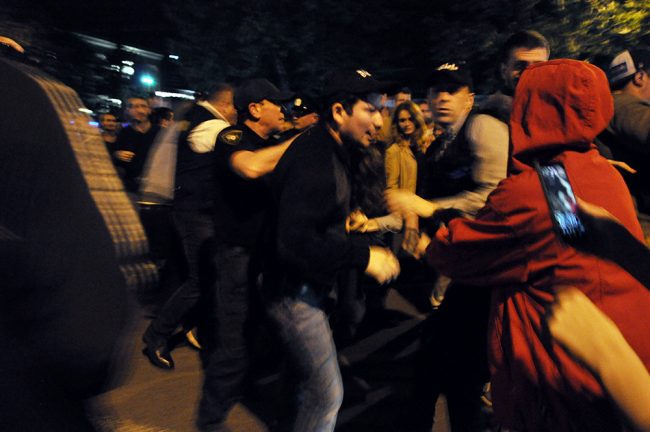
The White Noise Movement, a drug reform group who have been leading protests against the raids, met Gakharia on Monday to agree on the format of future talks. According to Gakharia, two working groups will be formed, to examine allegations of excessive use of force by police during the raids and to discuss drug reforms.
Despite support for efforts to decriminalise drug consumption from the Chair of Parliament’s Health Committee, Akaki Zoidze, on Monday Eka Beselia, who chairs the legal committee, told Rustavi 2 the ruling Georgian Dream party remains split over the issue. She said a group of MPs have warned that proposed changes could trigger a surge in drug abuse.
The following day, Justice Minister Tea Tsulukiani said that while she supports decriminalisation, legalisation of drugs is unacceptable for her. ‘Talking about legalisation is like demanding drugs be used as freely as drinking a Georgian wine. The state’s answer is No’, Tsulukiani said.
Talk of drug legalisation has not been promoted by the most prominent drug reform groups, but the issue was raised after the son of former Prime Minister Bidzina Ivanishvili, head of the ruling party, Bera published a hip-hop video on 13 May entitled Legalize.
Gakharia’s apology to protesters for the nightclub raids and promise to move fast on drug policy reform angered far-right counter-demonstrators on Sunday. In the following days, several Georgian Dream leaders have made tough statements against drug use and the drug trade. After meeting with protest leaders on Sunday, Gakharia said his agency’s prerogative was to pursue drug-dealers and the drug trade, and that this was not negotiable. ‘No one will limit the Ministry of Internal Affairs in this scope — full stop’, Gakharia said, adding that other issues are open for negotiations.




